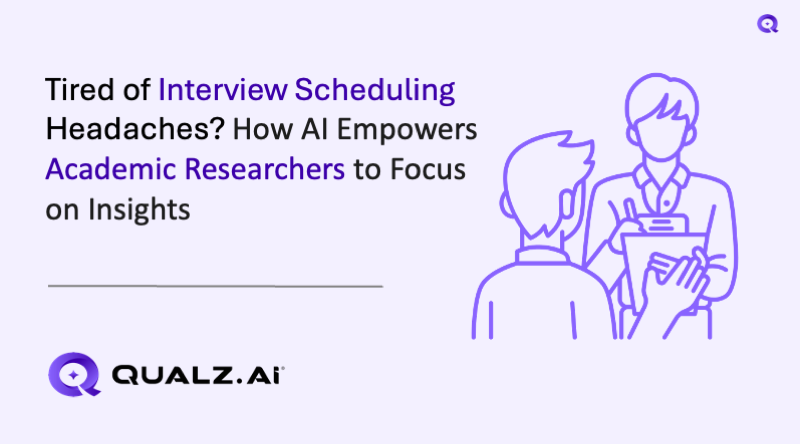For academic researchers, interview scheduling can feel like a full-time job. Juggling participant availability, syncing across time zones, and dealing with cancellations are not just annoying; they’re disruptive to your research timeline.
In a world where efficiency and publishing speed matter, many researchers are now turning to AI-powered solutions to eliminate this burden.
Topics Covered
ToggleWhy Traditional Interview Scheduling Holds You Back
Manual scheduling isn’t just inconvenient; it introduces delays, restricts participant diversity, and eats into the limited hours researchers have for actual analysis and writing.
Even worse, scheduling conflicts can derail carefully planned timelines, particularly for collaborative, multi-phase academic studies or projects under tight grant deadlines.
How AI Removes Interview Scheduling from Academic Research
Conduct Interviews Without the Calendar Chaos
Instead of coordinating meeting times, AI now allows researchers to conduct asynchronous interviews, where participants simply access a unique interview link at their convenience. These interviews are dynamically moderated by AI, which adjusts follow-up questions in real-time, preserving depth and nuance while eliminating the need to schedule anything. You can learn more about how this works in this guide on AI-moderated interviews.
Replace Recruitment Delays with Instant AI Participants
Need to test a hypothesis or pilot an interview framework fast? Researchers can now leverage synthetic AI participants that simulate human behavior and responses. These customizable personas allow for scalable, diverse input, perfect for early-stage exploratory research or when traditional recruitment is impractical. Discover how AI participants are reshaping how studies get started.
Design Smarter, Faster Interviews
Interview prep is easier, too. Many researchers use AI tools to design both structured and semi-structured interviews, blending automation with academic rigor. With flexible workflows, you can build your entire study and distribute it through secure links; no calendar invites are required. See how intuitive interview design tools are making the research setup seamless.
Beyond Scheduling: AI Powers the Entire Research Workflow
Interview scheduling is only part of the problem. Once data is collected, the real work begins—transcription, coding, analysis, and visualization. Here’s where AI truly shines:
Real-time transcription tools automatically identify speakers and convert voice to text, saving hours per interview. This is especially valuable for multi-language or cross-disciplinary studies using AI-driven transcription services.
- Instead of manually sifting through data, researchers can now rely on automated thematic analysis that identifies key themes and constructs in open-ended responses.
- AI also generates interactive codebooks—dynamic documents that help structure your insights for publication, ethics review, or grant reporting. Learn how these codebooks bring structure to chaos.
- Want to visualize your findings? With built-in tools for data visualization, you can turn complex insights into compelling visual narratives, ideal for lectures, conference presentations, or published papers.
Even existing datasets can be uploaded and instantly analyzed. Researchers are now streamlining workflows by uploading and analyzing transcripts directly.
The Academic Researcher’s Competitive Edge
By automating time-consuming steps, AI empowers researchers to focus on what matters: interpreting results, publishing findings, and advancing knowledge.
With no interview scheduling to manage and analysis done in hours instead of weeks, AI-enhanced research platforms are
- Saving time and reducing burnout
- Increasing research output and insight quality
- Supporting remote, global, and diverse research cohorts
- Helping researchers meet IRB standards effortlessly
If you’re an academic looking to elevate your qualitative work, this is more than just a trend; it’s your new research advantage.
Key Takeaways
- Interview scheduling is a barrier to academic research productivity.
- AI enables asynchronous interviews, synthetic participants, and automated design, freeing you from calendar conflicts.
- AI enhances the entire process, from transcription and coding to data visualization and reporting.
- These tools are helping academic researchers save time, meet deadlines, and publish faster.
